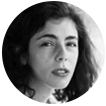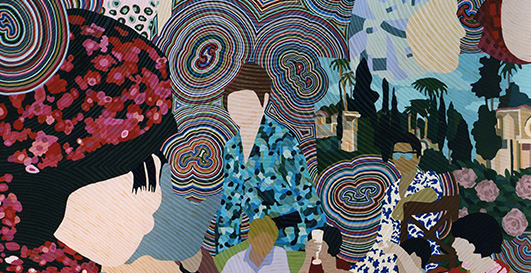
Lofiego

Those girls were so happy,
tearing off tree limbs, hugging their
daring bouquets, their splendid trousseaux,
the warm petals of wet flowers …
Color illuminated your eyes again.
Ted Hughes *
Living is walking through corridors, going up stairs, opening boxes in attics, projecting worn off yellowed slides. Reordering life into stages, rhythms, intensities in order to evoke the lost paradise of our childhood.
Nothing is more real than having inhabited that space. That hollow in which a matrix, a nucleus that printed what was given it and what it acquired along the way, was created. Like a train that goes non-stop along a long road, spreading impetuousness and incrustating microscopic universes. Landscapes, colors, odors, feelings, persons, ghosts, corners. We inhabit these diverse sceneries, with a little noisy wooden horse, a rusty tricycle, some furry teddy bears with worn out ears, small dresses with daisies on them, miniature porcelain cups with printed teapots.
Innocence, ignorance, opened for us the door of the great world where the older people ensured the tangible real dailiness. The coin had two sides. Some people had a mother who generated poiesis*, a mother who re-created reality, so definitely grey, with alchemy-colored veils. In her Buenos Aires apartment, Carolina’s mother had created a snow garden where she made her children contemplate the Russian steppes, sat them on a sleigh – chairs of the parlor – and, without knowing it – though she came to know it later -, took them directly into the non-conventional world of fantasy and break with opacity.
There, Carolina learned about beauty and the instability of beauty, adventure and the desolation of adventure. Without knowing it, she was weaving, taking in what she would paint later on. All that which was kept, printed, was done so by virtue of creation, of celebration of desire. Art is that Dionysian celebration, the possibility of joining together certain loose parts of the past and bringing them to the present. In the exhibition, these loose parts are made up by the photographic material taken by the family plus the landscapes her grandfather Demetrio used to paint. This is a collage of the past, an intricate relational and esthetical fabric.
However, the tense used by Carolina as title of some of her paintings is: continuous. Tense through which something manages to pass as if through a crack, a space where experience leaks into and is expressed, events lived turn into what they were lived as. Something got caught in time and is always a memory that the past brings into the present at its whim … Carolina’s characters walk along this fusion of time and space against a background of multicolored circular figures with rainbow colors. They are fixed, they invite us to play to their “domus”, the final dwelling to shelter them. That domestic space where loss and desire unite.
The characters are alive, printed, trapped as in a photograph. They are Vacío extremado (“Extreme Vacuum”), Objeto dependiente (“Dependent Object”), Proyecto discontinuado (“Discontinued Project”), Fobia (Phobia), Púber (“Pubescent”), Felicidad utópica (“Utopian Happiness”). They are more, many more. They are the space as meeting point from which to visit the large house made by Carolina, mansion of many rooms. Spectators, we remain at the threshold, enchanted, watching the characters go by with their faces without strokes to protect, in this way, their identity and emotions. It was only Orpheus that got to see Eurydice’s face – when she inhabited death – by turning round he violated the underworld’s God Hades’ command and thus lost her. In Antoniadis’ work, the absence of strokes on the face is a kind of salvation, preservation of a personal mythology. The characters keep their light, gaining direct access to their places in the lost paradise, now recovered. Continued. They become universal because we are able to reflect our own desires.
The white canvas indissolubly reminds us of snow, snow in which we can print the howl and the rose opened into red, we can print fright and wonder. Whiteness can be opened without limits, memory deposited in it. That large house, identity.
Paris, March 1st, 2006
Vivian Lofiego
*poiesis: Greek word that defines poetry as creation
*Ted Hughes, Birthday Letters
